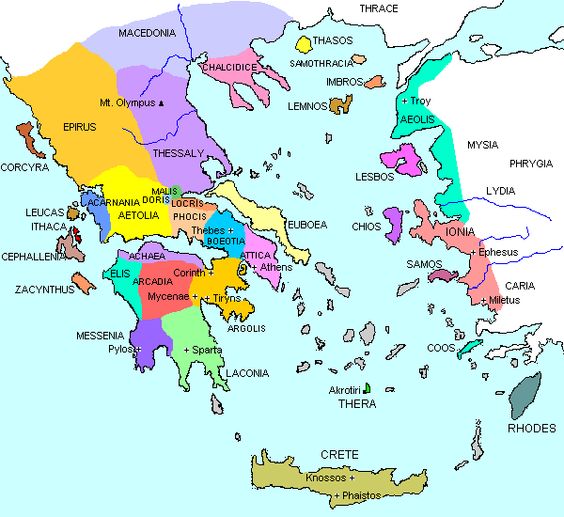Time: 11:40:21 CET
Topic: 7. The Hellenes
Tags: history, Greece, Hellenes, tribes, Ionians, Dorians, Achaeans, Eolians, Athens, Sparta, Peloponnesus, Heroic Age, migrations, Arian family, Phrygia, Asia Minor, emigrants, Thrace
The Four Founding Tribes of Greece: A Tale of Diversity and Rivalry

The ancient Greeks, or Hellenes as they called themselves, were not a monolithic people. They comprised four distinct families, each with unique characteristics and contributions to Greek history:
- The Ionians: A multifaceted and imaginative people, the Ionians readily embraced external influences. They excelled in artistic expression, literature, and philosophy. Athens, the cradle of democracy and a cultural powerhouse, stands as a testament to the Ionian spirit.
- The Dorians: In stark contrast to the Ionians, the Dorians were a practical and disciplined race. Their focus lay on physical prowess and military training, with little emphasis on artistic pursuits. Sparta, their most prominent city, embodied this emphasis on strength and warfare, ultimately becoming a rival to Athens.
- The Achaeans: Legends depict the Achaeans as the dominant force in the Peloponnese during the Heroic Age. Their influence was so profound that "Achaean" was sometimes used interchangeably with "Greek."
- The Eolians: The least well-defined of the four tribes, the Eolians often served as a catch-all category for Greeks not readily classified as Ionian or Dorian.
Roots and Migrations: A Journey Through Time
While the exact details of their prehistoric movements remain shrouded in mystery, we do know that by the 8th century BC, the various Hellenic tribes were settled throughout mainland Greece, the Aegean islands, and the western coast of Asia Minor.
Linguistic evidence suggests their connection to the broader Indo-European family. It's believed that their ancestors and those of the Romans co-existed for a period before diverging. Additionally, it's theorized that all the Hellenic tribes lived together as a single community before branching out to form their distinct identities.
The location of this ancestral homeland is a matter of speculation. Some place it in Phrygia, located in modern-day northwestern Turkey. From there, waves of migration are believed to have gradually populated Greece and the Aegean.
Theories on Migration Routes:
- The Ionians and Dorians may have been the last to depart their Phrygian home. Some believe the Ionians reached Greece by sea, while the Dorians crossed the Hellespont and settled in the Peloponnese.
- Others propose that all the Hellenes entered Greece through Thrace, a region north of mainland Greece.
The arrival of these diverse tribes laid the groundwork for the rich tapestry of Greek history, with the contrasting personalities of the Ionians and Dorians shaping the political landscape and ultimately leading to rivalries that would have lasting consequences.
A Divided Yet Unified People: The Paradox of Ancient Greece
The ancient Greeks, despite their fierce loyalty to their individual city-states, weren't entirely isolated. Underlying the political divisions, a sense of shared heritage bound them together as a loose-knit community.
Unity in Diversity: Race, Language, and Religion
Several factors transcended political boundaries and fostered a sense of pan-Hellenic identity:
- Race: They believed in a common ancestry, tracing their lineage back to a mythical figure named Hellen.
- Language: All Greeks spoke variations of the same Hellenic tongue, facilitating communication and cultural exchange.
- Religion: They shared a pantheon of gods and goddesses, with pan-Hellenic sanctuaries like Olympia serving as unifying centers for religious festivals and athletic competitions.
Hellenes vs. Barbarians: A Us vs. Them Mentality
The Greeks distinguished themselves from outsiders by referring to non-Greeks as "barbarians," a term initially signifying someone who spoke an unintelligible language. However, over time, it acquired a connotation of cultural inferiority, reflecting the Greeks' growing sense of intellectual superiority.
The Mythological Roots of the Hellenes
(Note: This section provides additional information that can be included for a more detailed explanation but can be omitted for a concise version.)
Greek mythology offers a narrative for their shared ancestry. Hellen, son of Deucalion (the Greek Noah), supposedly had three sons: Aeolus, Dorus, and Xuthus. Aeolus and Dorus fathered the Aeolians and Dorians, respectively. Xuthus, in turn, had sons named Ion and Achaeus, who became the forefathers of the Ionians and Achaeans, respectively. These four groups – Aeolians, Dorians, Ionians, and Achaeans – constituted the major Hellenic tribes.